Issue 12 : 19 August 2018
Talofa Lava, Kia Orana, Malo E Leilei, Tena Koutou, Hello ...
... and welcome to the latest issue of “For The Love Of The Game”, the official e-zine of the New Zealand Amateur Sport Association Inc. We hope you enjoy reading the articles below.
If you have any feedback on this issue, ideas for future articles, or would like to contact the Editor, please click here. And, you are invited to forward the e-zine to others you know, who may be interested in reading it.
If you are interested in applying for membership of the Association, please click here.
NZ ASA Seminar – Community Sports Events ...
The Association extends a cordial invitation to all interested in attending the first of its regional seminars, focusing on the role of amateur sport in the community.
On Wednesday, 26 September, an expert panel comprising Dr. Rachel Batty (from Massey University), Will Caccia-Birch (from Wellington Rugby) and Matt Reid (from the Hutt City Council) will consider the following questions.
- What does it take to create a successful community sports event?
- What are the challenges and pitfalls, and how can they be avoided or resolved?
- How can a community sports event’s success be measured?

This is an essential seminar to attend, if you’re involved in organising events for your sporting code which requires coordination with various stakeholders in your community.
For more details on the seminar and how to register, please click here.
Spaces are limited, so please ensure you reserve your place to attend.
Robbie Boerboom – 43 Years’ Service To Rugby ...
“No referee, no game”, was a saying originally attributed to former British Lions captain John Dawes OBE, who was the Captain of the only British & Irish Lions team to win a Test Series in New Zealand, in 1971.
Perhaps it was the example of New Zealand referee John Pring MBE (who refereed all four Test Matches on that tour), that prompted Robert Alexander Petrus (Robbie) Boerboom to take up the whistle two years later, in 1973. Over a career spanning 43 years, Robbie provided refereeing service to the Wanganui, Manawatu and Horowhenua-Kapiti Rugby Football Unions.
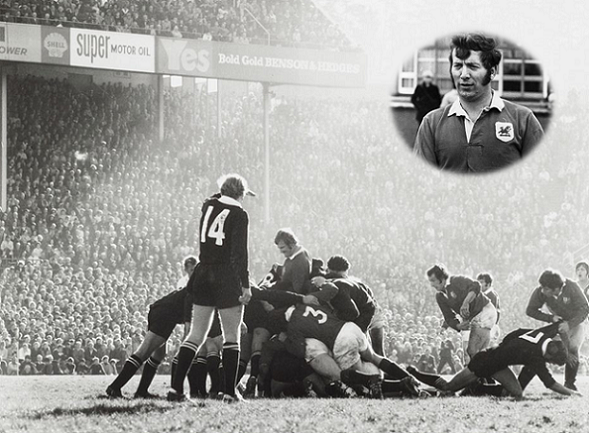
(John Dawes, inset, was the first to point out the obvious, in terms of Match Officials)
Boerboom was born in Indonesia, later moving to New Zealand when he was 10. The family lived in Marton where he played soccer, then rugby. After school, he played for the Marton Old Boys and Rangitikei representative teams.
He was 33 when he stopped playing. Robbie then began refereeing in the Rangitikei sub-union, and later in Wanganui, for a total of 22 years. He moved to Feilding and then Foxton, refereeing in Manawatu, as well as refereeing for three years in Horowhenua-Kapiti. Robbie died on 10 August at his home in Foxton.
(Robbie Boerboom served three Provincial Unions as a Match Official over 43 years)
The Association acknowledges Robbie’s voluntary contribution, “for the love of the game”.
Women In Sport Aotearoa (WISPA) ...
Based around the principles contained in the Brighton Declaration on Women and Sport, WISPA was established as an incorporated society in 2017 “to transform sport for the betterment of women’s and girls’ lives” by, (among other objectives) “being the voice for women in sport”.
WISPA’s newly appointed Chief Executive, Rachel Froggatt, notes that while women’s contribution to sport is immense, it is often under-valued, with WISPA aiming to promote the key role women play in sport, as part of New Zealand’s diverse communities.
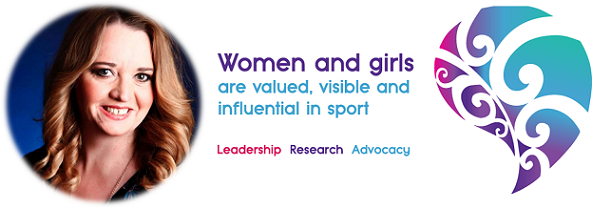
(Rachel Froggatt is the newly appointed CEO of WISPA)
New Zealand recently successfully bid to host the 8th International Working Group on Women in Sport secretariat, from 2018 to 2022. This role will culminate with WISPA hosting the 8th World Conference of the International Working Group on Women in Sport in Auckland, in 2022.
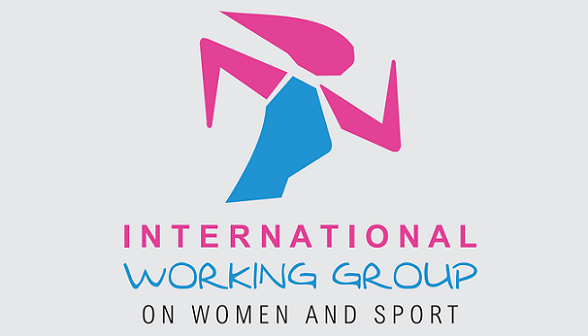
(New Zealand will host the 8th World Conference on Women and Sport in 2022)
The Association looks forward to developing an ongoing relationship with WISPA, as both organisations seek to develop stronger New Zealand communities through sport.
New Zealand Amateur Club Survey ...
With the support of AUT, the Association will shortly embark on its first national survey of Amateur Sports Clubs, (the first survey of its type undertaken in New Zealand).
Anecdotal evidence suggests that Clubs, as the nurseries of community sport across New Zealand, are facing increasing challenges in being viable and valid to the changing needs of their local communities, with the survey intending to explore this theory.
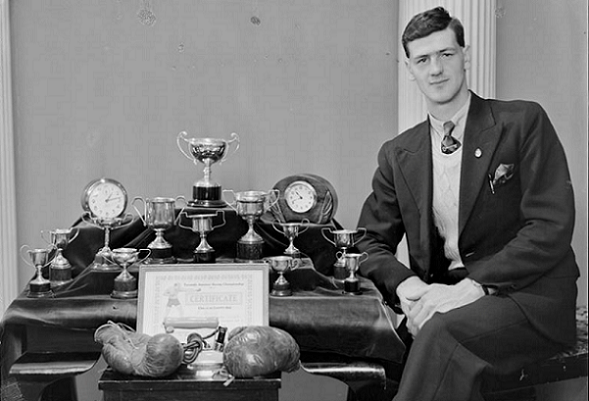
(The Association's survey will explore how important amateur clubs are in the 21st century)
The survey intends to obtain a snapshot of this issue (and others) across Athletics, Bowls, Basketball, Cricket, Harriers, Hockey, Netball, Rowing, Rugby League, Rugby Union, Soccer, Softball, Squash, Surf Life-Saving, Swimming and Tennis. The survey will contact Clubs across New Zealand, using a database based on registered incorporated sporting bodies extracted from the Register of Incorporated Societies.
eSports (Part 2) - The Asian Experience ...
A second survey undertaken by consumer research company Neilsen, reveals that people in Asia (China, Japan and South Korea), spend as much time engaging with eSports as they do with traditional sports. Overall the survey indicates that those that follow eSports spend on average one-half to three-quarters of their spare time, playing video games.
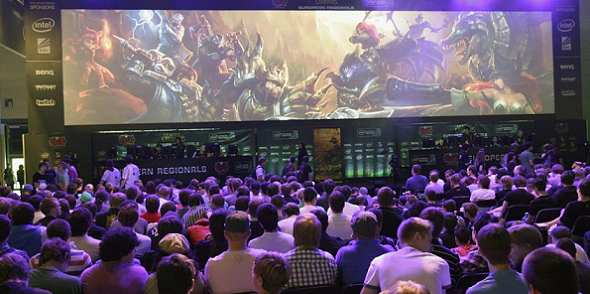
(Socially connected "on-line", or connected "on-field "- which is the future of sport?)
The survey notes, “one key factor that continues to appear in China, Japan and South Korea, however, is a feeling of connection. Fans in all three markets see eSports as a way to engage more deeply and connect with the games they love themselves. This is perhaps where eSports stands out from traditional sports the most.”
This is an interesting observation.
The survey suggests that in communities where social-connection owing to urban or environmental constraints is challenging, on-line interaction is becoming more important for a sense of identity and inclusiveness. In New Zealand, there is a need to understand what barriers are forming which may create a similar phenomenon.
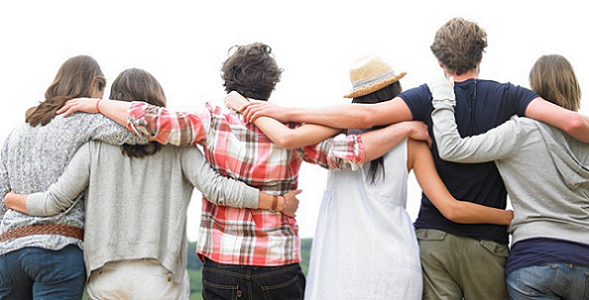
(Sport must provide reasons for social connection, for participants and spectators)
In China, Japan and Korea, it may be a lack of playing areas and organised sport clubs which provides the main incentive for social connectivity on-line, while in New Zealand it may be a decreasing opportunity for recognition in traditional sports (as a reason for participation), which is driving youth toward on-line fulfilment.
To read the full survey, please click here.
From The Archives ...
BOXING CONTROL
PRESS, VOLUME LXIII, ISSUE 18998, 12 MAY 1927
Copies of the rules of the New Zealand Boxing Council were distributed among Canterbury Members of Parliament yesterday, when representatives of the Council addressed them on the question of the control of the amateur branch of the sport. The deputation comprised Dr. P. F. McEvedy (president), Mr G. P. Aldridge (secretary), and Colonel K. St. J. Beere. The two first-named were the spokesmen.
The New Zealand Boxing Council, Dr. McEvedy said, was the elected representative of amateur boxing in the Dominion. He referred them to Rule 2, which stated the objects of the Council were "to govern and regulate amateur and professional boxing in New Zealand."
"We are a body of amateurs, controlling both professional and amateur boxing.” "We consider the sport is better controlled by an amateur body than by professional promoters," said Dr. McEvedy. "Not a penny derived from professional boxing is used on professional sport - it all goes to amateur sport.”
The New Zealand Boxing Council was an amateur body formed to govern both professional and amateur versions of the sport. In the early 1930’s, the Council became embroiled in a battle for control of the amateur code with an opposing body which claimed that that the Council was seriously conflicted by attempting to cater for the needs of both amateurs and professionals.
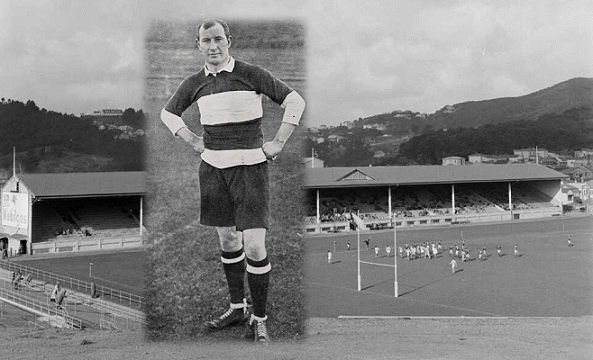
(Patrick McEvedy, inset, a proud Wellingtonian, represented Great Britain in Rugby Union)
Dr. Patrick McEvedy, who was a member of the Council for 11 years, reinforced the point that all money earned from the professional arm of the sport went directly to support the amateur game.
In the current era, where the professional arm of many sporting codes is operated on a corporate (for profit) model, the dividend to the amateur game is most likely no longer the sole purpose of the code’s existence.
The Final Word ...
“Sporting events foster a spirit of teamwork that far surpasses the events themselves.”
(Naveen Jain)